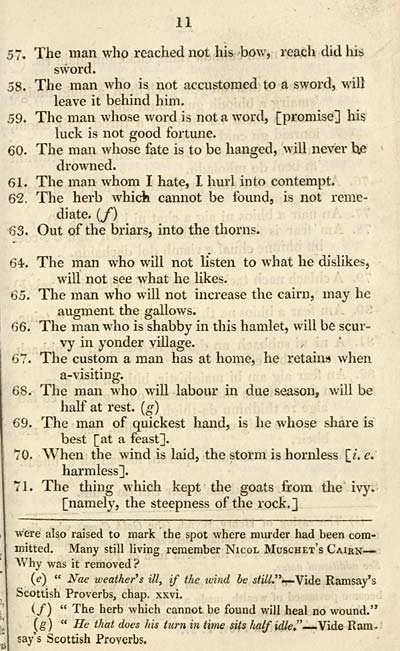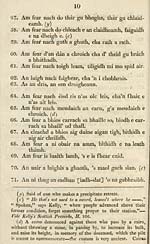Download files
Complete book:
Individual page:
Thumbnail gallery: Grid view | List view

11
57. The man who reached not his bow, reach did his
sword.
58. The man who is not accustomed to a sword, will
leave it behind him.
59. The man whose word is not a word, [promise] his
luck is not good fortune.
60. The man whose fate is to be hanged, will never he
drowned.
61. The man whom I hate, I hurl into contempt.
62. The herb which cannot be found, is not reme-
diate. (/) ^
63. Out of the briars, into the thorns.
64. The man who will not listen to what he dislikes,
will not see what he likes.
6o. The man who will not increase the cairn, may he
augment the gallows.
66. The man who is shabby in this hamlet, will be scur-
■ vy in yonder village.
67. The custom a man has at home, he retains when
a-visiting.
68. The man who will labour in due season, will be
half at rest, {g)
69. The man of quickest hand, is he whose share is
best [at a feast].
7G. When the wind is laid, the storm is hornless [/. e.
harmless].
71. The thing which kept the goats from the ivy.
[namely, the steepness of the rock.]
■were also raised to mark the spot where murder had been com-
mitted. Many still living remember Nicol Muschet's Caikn—
Why was it removed?
(e) " Nae weather's illy if the wind be 5/i//."— Vide Ramsay's
Scottish Proverbs, chap. xxvi.
(/) " The herb which cannot be found will heal no wound."
(g) " He that does his turn in time sits half idle," Vide Ram-
say's Scottish Proverbs.
57. The man who reached not his bow, reach did his
sword.
58. The man who is not accustomed to a sword, will
leave it behind him.
59. The man whose word is not a word, [promise] his
luck is not good fortune.
60. The man whose fate is to be hanged, will never he
drowned.
61. The man whom I hate, I hurl into contempt.
62. The herb which cannot be found, is not reme-
diate. (/) ^
63. Out of the briars, into the thorns.
64. The man who will not listen to what he dislikes,
will not see what he likes.
6o. The man who will not increase the cairn, may he
augment the gallows.
66. The man who is shabby in this hamlet, will be scur-
■ vy in yonder village.
67. The custom a man has at home, he retains when
a-visiting.
68. The man who will labour in due season, will be
half at rest, {g)
69. The man of quickest hand, is he whose share is
best [at a feast].
7G. When the wind is laid, the storm is hornless [/. e.
harmless].
71. The thing which kept the goats from the ivy.
[namely, the steepness of the rock.]
■were also raised to mark the spot where murder had been com-
mitted. Many still living remember Nicol Muschet's Caikn—
Why was it removed?
(e) " Nae weather's illy if the wind be 5/i//."— Vide Ramsay's
Scottish Proverbs, chap. xxvi.
(/) " The herb which cannot be found will heal no wound."
(g) " He that does his turn in time sits half idle," Vide Ram-
say's Scottish Proverbs.
Set display mode to: Large image | Transcription
Images and transcriptions on this page, including medium image downloads, may be used under the Creative Commons Attribution 4.0 International Licence unless otherwise stated. ![]()
| Early Gaelic Book Collections > Blair Collection > Mackintosh's collection of Gaelic proverbs, and familar phrases > (31) |
|---|
| Permanent URL | https://digital.nls.uk/80462458 |
|---|
| Description | A selection of books from a collection of more than 500 titles, mostly on religious and literary topics. Also includes some material dealing with other Celtic languages and societies. Collection created towards the end of the 19th century by Lady Evelyn Stewart Murray. |
|---|
| Description | Selected items from five 'Special and Named Printed Collections'. Includes books in Gaelic and other Celtic languages, works about the Gaels, their languages, literature, culture and history. |
|---|

